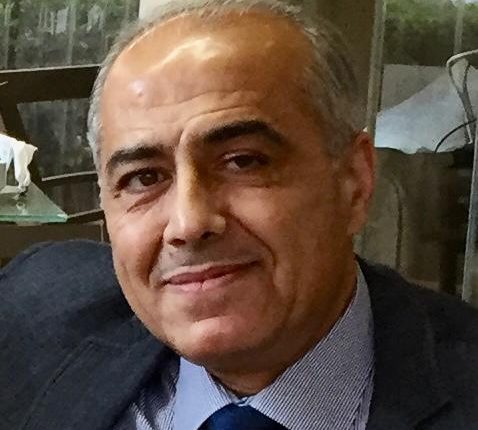THE EMERGING ISRAELI-ARAB DEFENSE COALITION
By General Monzer El Ayoubi

Translation: Pierre A. Sarkis
After an unprecedented path in the history of the Arab-Israeli conflict undertaken by several Arab and Arab Gulf countries, defined by the steps towards normalization in the form of establishing political and economic relations with the Zionist State of Israel, its agencies and its citizens, these countries totally ignored, marginalized, even shattered the animosity and hostility policies Israel practices, through its occupation and and racism, or the blockade imposed on the Palestinian people. All this was apparent in the resounding Arab reticence, impassivity, added to its hesitant and timid denouncement at best, of Israeli practices.
Consequently, an advanced and probably expected phase started to create a defensive-security alliance to complete the political and economic link, which would include Arab Gulf countries, such as, the United Arab Emirates (UAE), Bahrain, and others, especially after establishing diplomatic relations last year with the enemy Israel, through the opening of embassies and exchange of ambassadors. Noticeable though was what one Hebrew website reported, which was quoted by well informed sources “the Kingdom of Saudi Arabia which is not tied to Israel through declared official relations, will join the alliance, and this issue has been agreed upon between Saudi Crown Prince Mohamed Bin Salman, and Israeli Prime Minister Benjamin Netanyahu, during a secret brief visit by the latter, on the 22nd of September, 2020, to the Saudi city of Neom, accompanied by “Yossi” Meir Cohen, the head of the Israeli National Intelligence Agency, Mossad. Then-US Secretary of State Mike Pompeo was also participated in the meeting.”
In a related context, the moment the UAE Ambassador arrived in Israel, the impetus was the announcement made by Israeli channel i24NEWS during its news report last week, that “Tel Aviv addressed Saudi Arabia, the UAE and Bahrain in order to create a regional, security and defensive alliance after the NATO example, to deal with the increasing Iranian threat in the region. Israeli Defense Minister Benny Gantz disclosed without going into details, the intention of establishing “a special security arrangement” with the Arab Gulf Countries that conduct relations with Israel, and share anxieties in respect to Iran.
Accordingly, Israeli Prime Minister Benjamin Netanyahu welcomed Mohamed al Khaja, the first UAE Ambassador in Tel Aviv, and leaving aside all general terminology and protocol compliments, Netanyahu summarized the meeting in one sentence “we are changing the Middle East, we are changing the world”. But the word “we” carries two-pronged explanations: one, it could mean on behalf of both parties, the UAE and Israel; or, it could mean Israel alone, the latter being the more probable, even the definite one.
What are then the goals of this quadripartite defensive alliance? In addition to the traditional expression, protecting and safeguarding regional mutual interests, and without delving into the marginal issues, it seems that the main strategic goal is to prevent Iran from becoming a nuclear power, suppress its ballistic missiles program (IBMP), and confront its increasing military influence and threats in the Middle East, through its proxies in Syria, Iraq, Lebanon and Yemen.
At the same time, a small Israeli committee led by Israeli Foreign Minister Gabi Ashkenazi, was liaising behind the scenes with the US Administration, in order to identify a channel of coordination regarding the stages and provisions the US will follow, in adhering to a modified nuclear agreement with Iran, JCPOA. In tandem, Israeli sources leaked information that “Saudi Arabia is worried” from decisions that could be implemented by US President Joseph Biden, with respect to many files of mutual interest, such as, human rights, military weapons sales embargo, ending the Yemeni war, etc… Thus, opening channels of communications with Tel Aviv at this specific juncture, was to lessen the damage, coordinate the response, and cope with the new US Administration.
Meanwhile, it seems without a doubt that this defensive alliance is going to raise tensions in the region, as any Israeli military presence in Gulf Countries will become a target for Iranians in the case of a possible conflict, or war. A question poses itself in the midst of this obvious urgency: if the defensive or military alliance with some of the regional countries, especially the Gulf Countries, is something that Israel has sought, why doesn’t it strike a defensive alliance with the US? Israeli leadership believes that its strategic interests lie with the Arab-Israeli Defense Coalition, in that it allows her a free hand, and secures concessions to bolster its ability to confront Iran, such as, the use of logistical installations or military ports, as well as, allow Israeli Air Force to fly over the airspace of these countries, etc…
However, a defensive alliance with the US will not provide Israel an additional deterrent, as its drawbacks will outweigh its advantages. It will, first and foremost, infuriate Russia, whose forces are stationed in Syria, and will restrict Israeli offensive capabilities and air strikes which it is launching on military bases of the Iranian Revolutionary Guards, or armed factions, or the Syrian Army. In addition, it will need to coordinate its operations with the US Central Command (CENTCOM) and the Pentagon as needed, and according to viability, and this is mainly what Israel is not looking for and does not need, for strategic cooperation with the US is profound and solid.
As for Iran, which is under Israeli watch, with the latter’s close monitoring of its drift rate towards nuclear capabilities, it considers such a strategic alliance a threat to its national security, the security of the Persian Gulf and the strategic straits and waterways. In that context, establishing such an alliance cannot translate commitments, into a delicate and vulnerable military capability, or otherwise, a weakness in the horizontal and vertical security structure for the member countries. As such, the Alliance will be integrated in bloc politics, as a result of the asymmetry of strategic goals (common enemy, mutual interests, etc…).
As an emerging catalyst, it looks like the Quadripartite Defensive Coalition is a rejuvenated draft, or a miniature version of what President Trump put forward, but failed to attain, and that was to form at that time, the Middle East Strategic Alliance (MESA), later dubbed an Arabic NATO. The latter was to include eight Arab countries, members of the Gulf Cooperation Council (GCC), in addition to Jordan and Egypt, all countries of the Moslem Sunni faith, aiming to confront first, Moslem Shiite Iran, and second, the fanatic terrorist factions. This alliance will also minimize the deployment and presence of US forces in the region, and thus, alleviate the military effort, while securing US interests and stabilizing the region. The indirect goals however are numerous, diverse and complex, and could be mainly summarized by the inclusion of Israel in that alliance, based on a forefront plan for normalization of relations with Arab Gulf Countries. MESA will also pressure Gulf Countries to increase its budgets and purchases of US military weapons to bolster its defensive systems.
Alternatively, it is obvious from statements made by Iranian officials, that the Arab-Israeli Defense Coalition will not force Iran to compromise in its negotiations with the US and the European Union. In case negotiations fail, and US sanctions on Iran remain, which should not be the case, it would lead Iran to break the terms of the nuclear agreement, and proceed to enrich uranium by 20%, while preventing International Atomic Energy Agency (IAEA) monitors and observers from inspecting its nuclear installations. This also means that Iran will further develop its already advanced missile program, and will shift from the tactical stage of the “Missile Rain”, to the accuracy phase, using smart technology to guide and hit targets. As for its allies, proxies and military tentacles in the region, it will continue to upgrade their fighting standards and capabilities and bolster the quality of their armaments, to allow them to win out, or at least, hold out in their lopsided, asymmetrical, or disproportional wars, raging in the numerous arenas and fronts in the region.
At the White House, President Biden’s strategy seems to be rational and strict, in contrast to the previous Trump Administration. The broad strategic national security policy he will adopt in the region, the double pattern, calls for the protection of US allies, safeguard their strategic interests, consolidate combat capabilities of US troops wherever they are deployed, prevent any military activities by the Iranian Revolutionary Guards, and suppress any attacks launched by Iranian-backed militias against US military bases in Iraq and Syria. This will go along with a commitment to put an end to the US policy of “maximum pressure”, and embrace a dynamic diplomatic course to deal with the pending regional portfolios.
In concluding, what about occupied Palestine? In terms of structure, US Secretary of State Anthony Blinken, stressed that President Biden will not retreat from the decision taken by President Trump to recognize Jerusalem as Israel’s capital, and move the US Embassy there. In terms of the revealed substance, and according to his archived statements during his presidential campaign, the US President refrains from taking any one-sided decisions regarding the integration of occupied territories, and supports normalization, rejecting President Trump’s Deal of the Century. He is convinced that the only possible and sustainable solution to the Israeli-Palestinian conflict is the two states resolution, which reflects the legitimate rights and the aspirations of the Israeli and Palestinian peoples alike. This was expressed and confirmed by Richard Miller, the US Officer-in-Charge at the United Nations, when he said “President Biden believes in a negotiating course leading to the two states solution, where Israel lives in peace and security alongside a Palestinian state, enjoying the basic fundamental elements of viability “and survival.
Scholar in Security and Strategic Affairs
Beirut, 06/03/2021

